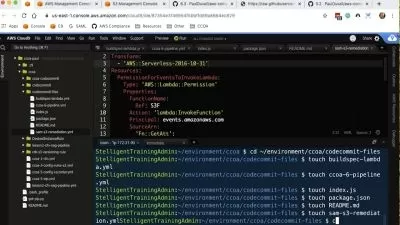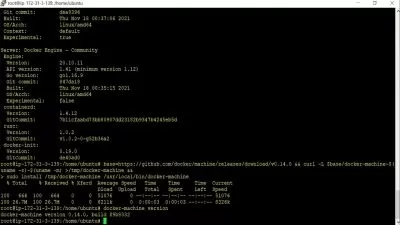Object-Oriented Design for Embedded Apps: SOLID Fundamentals
CodeWave Education,Usama Mahmood
1:02:54
Description
Master Object-Oriented Design Patterns and Programming for Embedded Systems with Practical Patterns and SOLID Principles
What You'll Learn?
- Understand how object-oriented design applies to embedded systems
- Adapt design principles to various embedded environments
- Implement essential design patterns for efficient coding
- Create objects dynamically with Factory Method and Singleton patterns
- Simplify complex subsystems using Adapter, Decorator, and Facade patterns
- Manage state transitions and object communication with Behavioral Patterns
- Ensure code flexibility and maintainability with SOLID principles
- Master C and C++ coding techniques for embedded applications
- Learn industry-tested practices for embedded systems development
- Develop scalable and efficient embedded applications with confidence
Who is this for?
What You Need to Know?
More details
DescriptionIn this course, you'll master the core principles of Object-Oriented Design (OOD) and Programming tailored specifically for embedded systems. You'll learn to design reliable and maintainable object-oriented systems, making you a more productive developer and opening new perspectives in embedded software design.
Embedded systems development increasingly benefits from Object-Oriented Programming (OOP) principles. Leveraging OOP can help you write clean, efficient, and maintainable code, essential for the complexities of modern embedded applications.
You'll learn:
Understand Object-Oriented Design in Embedded Systems: Grasp the importance and benefits of applying object-oriented design principles in embedded applications.
Master C and C++ for Embedded Systems: Develop proficiency in C and C++ programming, focusing on techniques and tools for effective code management.
Adapt to Different Embedded Environments: Learn to handle the constraints of hosted and freestanding environments, including memory management and performance considerations.
Implement Key Design Patterns: Gain practical knowledge of essential design patterns (Creational, Structural, Behavioral) and their implementation in embedded systems.
Use Creational Patterns: Apply the Factory Method and Singleton patterns to manage object creation and ensure controlled access to instances.
Utilize Structural Patterns: Implement the Adapter, Decorator, and Facade patterns to integrate interfaces, add dynamic behavior, and simplify complex subsystems.
Employ Behavioral Patterns: Leverage the State Machine, Observer, and Strategy patterns for managing state transitions, object communication, and algorithm interchangeability.
Apply SOLID Principles: Master the SOLID principles (Single Responsibility, Open/Closed, Liskov Substitution, Interface Segregation, Dependency Inversion) to design robust, maintainable software.
Adopt Industry Best Practices: Learn industry best practices for embedded systems design, including testing methodologies, debugging techniques, and performance optimization.
Develop Maintainable and Scalable Embedded Applications: Acquire the skills to create efficient, scalable, and maintainable embedded software by integrating design patterns and SOLID principles into your development process.
This course is designed for embedded systems developers who want to master Object-Oriented Design and Programming. Whether you're a beginner or an experienced programmer, you'll find valuable insights and practical techniques to enhance your development skills.
Join us on this exciting journey into the depths of Object-Oriented Design and Programming for embedded applications!
Who this course is for:
- Software Developers transitioning to object-oriented programming with a focus on C++ and UML
- Computer Science students eager to grasp Object-Oriented Design and Analysis concepts using C++
- Embedded Systems Engineers seeking to enhance their understanding of OOAD principles in C++ development
- Professionals aiming to strengthen their skills in Object-Oriented Programming and Design methodologies
- Junior Developers looking to solidify their understanding of OOP concepts and practices with C++
- Project Managers keen on gaining insights into Object-Oriented Analysis for effective software development
- Tech Enthusiasts eager to dive into Object-Oriented Programming and Design with a crash course approach
- Software Architects interested in refining their knowledge of SOLID principles in C++ development
- System Analysts seeking to apply UML techniques for better Object-Oriented Design comprehension
- Career changers aspiring to enter the software development industry by mastering Object-Oriented Programming and Design using C++
In this course, you'll master the core principles of Object-Oriented Design (OOD) and Programming tailored specifically for embedded systems. You'll learn to design reliable and maintainable object-oriented systems, making you a more productive developer and opening new perspectives in embedded software design.
Embedded systems development increasingly benefits from Object-Oriented Programming (OOP) principles. Leveraging OOP can help you write clean, efficient, and maintainable code, essential for the complexities of modern embedded applications.
You'll learn:
Understand Object-Oriented Design in Embedded Systems: Grasp the importance and benefits of applying object-oriented design principles in embedded applications.
Master C and C++ for Embedded Systems: Develop proficiency in C and C++ programming, focusing on techniques and tools for effective code management.
Adapt to Different Embedded Environments: Learn to handle the constraints of hosted and freestanding environments, including memory management and performance considerations.
Implement Key Design Patterns: Gain practical knowledge of essential design patterns (Creational, Structural, Behavioral) and their implementation in embedded systems.
Use Creational Patterns: Apply the Factory Method and Singleton patterns to manage object creation and ensure controlled access to instances.
Utilize Structural Patterns: Implement the Adapter, Decorator, and Facade patterns to integrate interfaces, add dynamic behavior, and simplify complex subsystems.
Employ Behavioral Patterns: Leverage the State Machine, Observer, and Strategy patterns for managing state transitions, object communication, and algorithm interchangeability.
Apply SOLID Principles: Master the SOLID principles (Single Responsibility, Open/Closed, Liskov Substitution, Interface Segregation, Dependency Inversion) to design robust, maintainable software.
Adopt Industry Best Practices: Learn industry best practices for embedded systems design, including testing methodologies, debugging techniques, and performance optimization.
Develop Maintainable and Scalable Embedded Applications: Acquire the skills to create efficient, scalable, and maintainable embedded software by integrating design patterns and SOLID principles into your development process.
This course is designed for embedded systems developers who want to master Object-Oriented Design and Programming. Whether you're a beginner or an experienced programmer, you'll find valuable insights and practical techniques to enhance your development skills.
Join us on this exciting journey into the depths of Object-Oriented Design and Programming for embedded applications!
Who this course is for:
- Software Developers transitioning to object-oriented programming with a focus on C++ and UML
- Computer Science students eager to grasp Object-Oriented Design and Analysis concepts using C++
- Embedded Systems Engineers seeking to enhance their understanding of OOAD principles in C++ development
- Professionals aiming to strengthen their skills in Object-Oriented Programming and Design methodologies
- Junior Developers looking to solidify their understanding of OOP concepts and practices with C++
- Project Managers keen on gaining insights into Object-Oriented Analysis for effective software development
- Tech Enthusiasts eager to dive into Object-Oriented Programming and Design with a crash course approach
- Software Architects interested in refining their knowledge of SOLID principles in C++ development
- System Analysts seeking to apply UML techniques for better Object-Oriented Design comprehension
- Career changers aspiring to enter the software development industry by mastering Object-Oriented Programming and Design using C++
User Reviews
Rating
CodeWave Education
Instructor's CoursesUsama Mahmood
Instructor's Courses
Udemy
View courses Udemy- language english
- Training sessions 10
- duration 1:02:54
- Release Date 2024/09/18




















